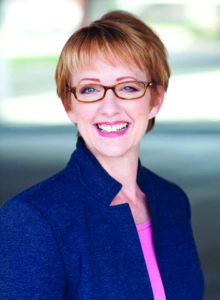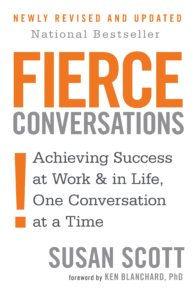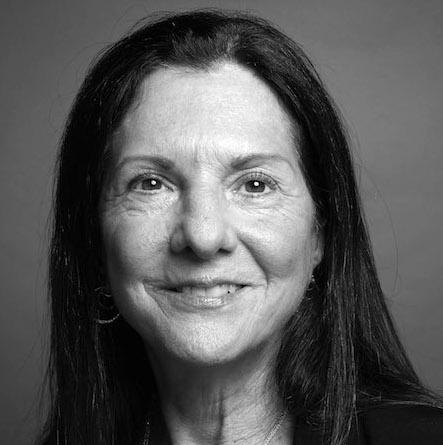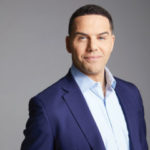Most of us increasingly rely on email, texts, Slack messages, and other digital platforms to communicate at work — instead of having face-to-face conversations. Which makes the premise behind Susan Scott’s bestselling book Fierce Conversations: Achieving Success at Work & in Life, One Conversation at a Time — published 16 years ago — all the more relevant today.
The book, and Fierce Inc., the leadership development and training company Scott founded in 2001, offer the principles, skills, and tools “needed to engage in conversations that produce mind-blowing, world-class results in the workplace [and]… at home,” according to the book’s introduction.

Molly Breazeale, a Fierce Inc. master facilitator, will bring Scott’s philosophy to PCMA Convening Leaders 2019 in Pittsburgh in January. Breazeale will share how effective communication can drive business results and why the Fierce approach fits so well in the events industry — a business that, as Breazeale points out, is built on relationships.
In a digital age, why care so deeply about verbal communication?
Think about trying to go through any given day without being able to have a conversation. Sometimes we think, “Well, that would be fabulous. I could get some work done if I didn’t have to have a conversation.” But truthfully, nothing happens until we have a conversation. That’s why Susan Scott calls conversations the workhorse of business.
Why the word “fierce”?
Susan Scott looked for a word to convey not just any conversation, but conversations that were authentic and powerful and robust.
 What attracted you to the Fierce team?
What attracted you to the Fierce team?
When I was head of corporate training for an insurance company, I was working with my managers to help them do a better job at speaking up and having the conversations that were really important, and that’s how I met Susan, at the Association for Talent Development [formerly ASTD] conference in 2005 or 2006. I went to her workshop. I loved what I heard. I came back and I piloted Fierce in my organization and decided to bring it in.
What was so compelling?
Truth resonates when you hear it. For example, she said, “The conversation is the relationship.” She backed that up and said, “Just think about it for a minute. What happens when your conversations with others stop? The relationship changes.” This idea that the conversation is the relationship is something I’ll talk about [at Convening Leaders].
Can you share a Fierce lesson?
We take some relationships for granted. I had an employee who did a great job, and so a lot of times I would see my one-on-one on the calendar with him and I’d think, “Well, I don’t really have anything I need to talk to him about today. He’s doing great.” I would send him a note and say, “Do you want that time back on your calendar? Because you’re awesome and we don’t need it.”
A few months went by, and I wasn’t avoiding him, but sometimes we give our most talented people the least amount of attention. He came to me and said, “Molly, I just got this great job offer in another part of the organization and you really don’t need me so much anymore. I’m going to go.” To me, it was a great lesson that my conversations are like capital. I want to invest it wisely.
Do you think there’s less of an emphasis on workplace communication today?
I think we have substituted technology for conversation in some cases. We’ll think, “I sent you an email” and that’s been a touch-base. Also, we’re on 24/7 and research tells us that we’re not good at estimating how much time something is going to take. We over-schedule. We squeeze out any margin for being able to have conversations. We’re really missing out on the quality that rich conversation brings to our lives.
How do you gear this message to the business-events community?
It really is a relationships business and it’s a business that runs in cycles. So if, for example, it’s a seller’s market and they want to charge me what used to cost $150, say to drop some cable for an event, that might now cost $1,000. This is where your relationships come in. If I’ve been working with somebody at a property and built a great relationship and I get that kind of sticker shock, I can call on my relationships to see what I can do to better negotiate.
What else can we expect to hear at Convening Leaders?
Three Fierce big ideas. No. 1 is that our careers, our lives, succeed gradually then suddenly, one conversation at a time. So I should be asking myself: “Where are my conversations taking me? Who am I asking about conventions or meetings that they’ve attended where they saw something new and exciting that really worked?” We have to be out there constantly keeping ourselves relevant to our industries and to our audience.
Another idea is: I have to be masterful at building relationships. When I realize the conversation is the relationship it helps me consider all those touch points and why they matter.
A third idea is a funny one. Susan Scott says, “All conversations are with myself. And sometimes, they involve other people.” If you stop and think about it, who do we talk to all day long? As an event planner, I think I should be having a conversation with myself about what I want people saying when [the event ends] and they walk away.
Learn more about Fierce Inc. at fierceinc.com.
Learn more about Fierce Inc. Master Facilitator Molly Breazeale, owner of consulting firm AlignED, an authorized provider of Fierce Conversations, at align-ed.com.




